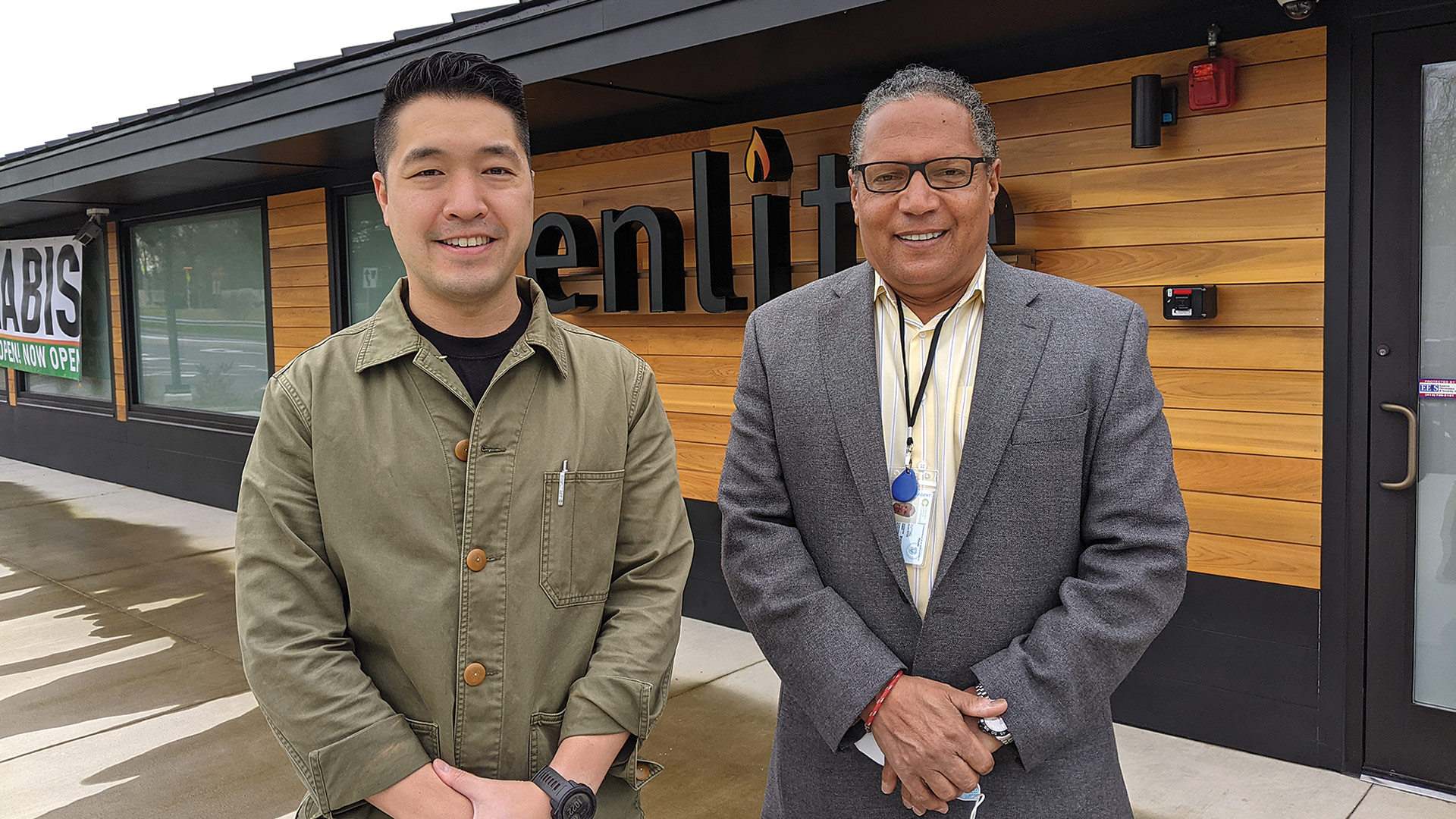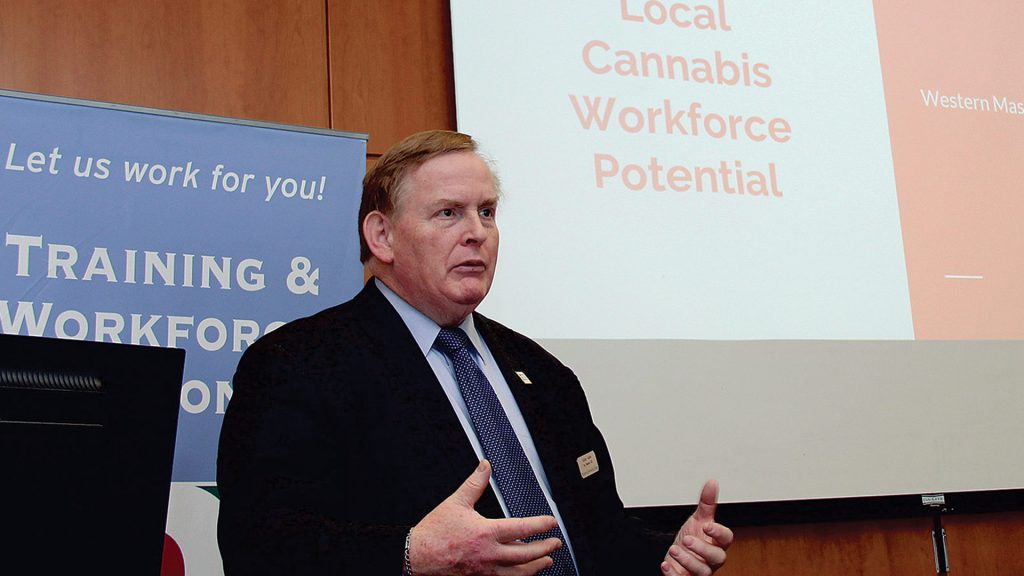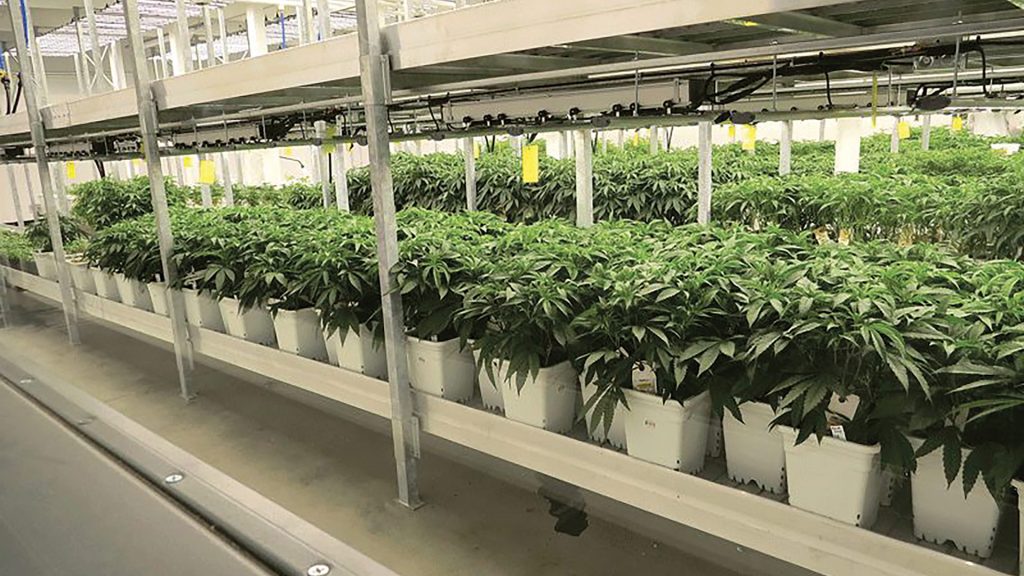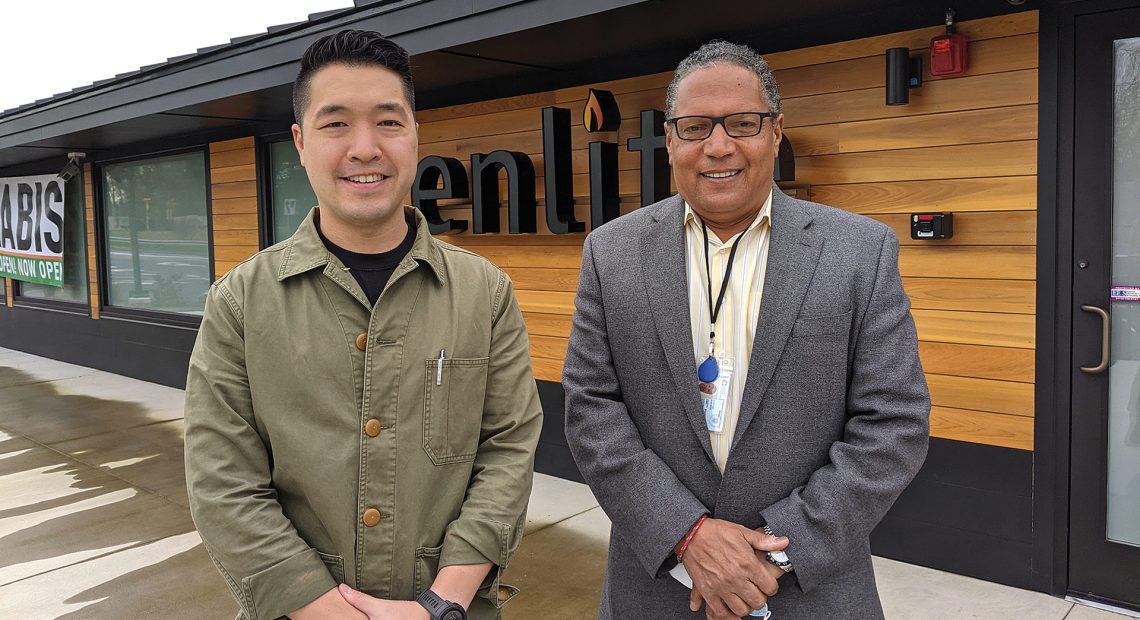Rolling Along

Matt Yee and Mark Cutting of Enlite in Northampton
Massachusetts had already legalized medical marijuana when voters were faced with another question in late 2016: whether to legalize cannabis for recreational use. The vote wasn’t close, sailing through on talk of jobs, tax revenue, and, well, people wanting to light up legally. Reality doesn’t always live up to promise, but in this case, it has. Yes, the industry is still facing growing pains, particularly when it comes to creating a level playing field for entrepreneurs. But when it comes to this new industry’s impact on jobs, real-estate investment, municipal tax revenue, and more, these are truly high times.
David Narkewicz wasn’t just a supporter of cannabis coming to Northampton. He was the first customer.
That was three years ago, when NETA opened on Conz Street and became the state’s very first dispensary for legal, recreational cannabis. Today, with cannabis businesses proliferating in the city and across Massachusetts, the outgoing mayor believes his initial enthusiasm was justified.
“We saw the experience of other states, and a lot of the Massachusetts law, when they were trying to put together the regulatory framework, was based on looking at laws in other states,” Narkewicz said. “First and foremost, I supported legalization just as a public-policy meaure, but I also saw an opportunity for investment in the community.”
Elaborating, he said the city is known as a destination with a vibrant retail sector, arts and culture establishments, and plenty of restaurants and bars. “So my sense, and my hope, was that this would be a new investment in the community and a new source of jobs and revenue, and another reason to come to Northampton. I think we took a pretty forward-looking approach to this.”
Today, Northampton is home to eight retail dispensaries for adult-use cannabis, seven manufacturers, four cultivation facilities, and a testing lab. Those numbers grow seemingly by the month.
Meanwhile, three years of excise taxes on adult-use cannabis have brought in more than $4.3 million. “That helps us continue funding schools, police, fire, DPW, all the services we provide as a city.”
Mark Cutting and Matt Yee certainly saw potential, not only in the state’s legalization of cannabis, but Northampton’s embrace of it. Just last week, they opened the city’s eighth adult-use dispensary, Enlite, just off the Coolidge Bridge rotary — and they have a long-term vision for it based on the idea that this is a still-evolving industry.
“Our getting into cannabis was really just another attempt on our part to find jobs that people can get into at the entry level, or get a better job. It’s imperative that we find people who are unemployed, underemployed, those with limited education, limited work history, and get them into employment and on a career track.”
“We thought that, with our background in business and the Yee family’s background in restaurants and entertainment, there may be potential beyond even the retail space,” Cutting said. “There may be opportunities to have some type of dining or some type of entertainment along with cannabis partaking at some point in time — though that’s not legal here yet.”
Yee noted that the sheer number of cannabis businesses in Massachusetts — almost 190 and counting, not just in retail, but in cultivation, manufacturing, and wholesaling — is making it easier for all players to succeed, because of the cross-pollination. It’s why Enlite has adopted the model of many area dispensaries of partnering with boutique makers of cannabis products.
“Early on, it was difficult because [product] availability was so low, you had to be vertically integrated to supply yourself,” he noted. “But Western Mass. has been really kind to small-scale producers, and we’re really happy to showcase them here at this location.”
Cutting added that “a lot of the multi-state operators don’t necessarily like companies like that to sit on their shelves. But we’re basically an open market for some of these producers to share shelf space and advertise their product here locally.”
With each business open, total sales in Massachusetts increase — crossing the $2 billion mark, in fact, earlier this month, a number even proponents might not have expected so soon after voters approved legalizing recreational cannabis in November 2016, four years after giving a similar go-ahead to medical marijuana.

Jeff Hayden says cannabis has created fertile ground for hundreds of new jobs in Holyoke — and an impressive diversity of them.
And those businesses mean jobs, said Jeffrey Hayden, vice president of Business and Community Services at Holyoke Community College (HCC).
“We’ve experienced high levels of unemployment during the pandemic; both Springfield and Holyoke unemployment have been ahead of the federal and state average. In both communities, we see a strong need to connect people to the workforce,” Hayden told BusinessWest.
That’s one reason HCC became a lead partner in the creation of the Cannabis Career Center in late 2019. If HCC exists to give people the skills they need to get into jobs, he reasoned, then the potential of cannabis couldn’t be ignored — especially in a city rivaled only, perhaps, by Northampton in its full-on embrace of this new industry.
“Our getting into cannabis was really just another attempt on our part to find jobs that people can get into at the entry level, or get a better job,” he explained. “It’s imperative that we find people who are unemployed, underemployed, those with limited education, limited work history, and get them into employment and on a career track.”
But cannabis is changing Holyoke in other ways, too, notably in its canal district, where long-neglected mill buildings are springing to life with cannabis cultivation, manufacturing, and sales.
David Narkewicz
“We put in place zoning regulations that were not onerous; we’re essentially allowing retail cannabis anywhere we allowed retail, and it was generally the same for manufacturing.”
“The private investment in Holyoke as a result of this industry coming to Massachusetts has been extremely significant,” Hayden said. “Cannabis companies are buying properties that have been long underutilized — and it’s not like acquiring a building and leaving it as is; they’re investing significant dollars to improve it and create new jobs in the city, literally hundreds of jobs already. And, obviously, the tax revenue generated for the city is significant. This is a growing industry in Massachusetts.”
That’s true — literally and figuratively. Five years after that critical vote and three years after businesses started opening, cannabis has proven to be a hardy economic driver, one that not only survived the pandemic, but thrived throughout it. And no one really knows what the ceiling may be.
Ironing Out the Issues
Not everything has been smooth in what is becoming a hyper-competitive market. Enlite is the state’s first Minority Business Enterprise (MBE) applicant to open its doors, and Yee concedes that the Cannabis Control Commission’s stated commitment to MBE and social-equity opportunities — with the goal of helping communities and demographics negatively impacted by the war on drugs to access entrepreneurship opportunities in cannabis — has met with inconsistent results.
“It’s a really big topic in the industry. We’ve had a lot of commissioners change out in the last year or so, and a lot of people in the program saw CCC failing them as far as getting those applicants to the finish line,” Yee explained. “It’s a combination of things: operators with not a lot of resources can be an issue. Obviously you’ve got your multi-state operators with a million dollars allocated to their lawyers and legal teams, so they’re able to have the resources to get them pushed through a little bit faster. Those are big issues.”

Holyoke’s mill district has become a promising location for cannabis cultivation for companies like GTI.
But things are changing, he added, with new commissioners “really focusing on those applicants and assisting them, figuring out where the pain points are and getting them to the finish line and open. We’ve been seeing some traction on that.”
The process can be a tricky one (see related story on page 22).
“The biggest issue — because it’s not federally legal — is access to capital,” Cutting said. “It’s a journey getting through the CCC, and if you do make a mistake and don’t dot your I’s and cross your T’s, it gets rejected, and you have to start all over again, and you don’t necessarily go back to the same queue you were in — you may go to the bottom of the pile. And it can be a long, painful process to get back to the top of the pile. And God forbid you make a mistake again.”
It helped, he said, to deal with a city that didn’t limit the number of application approvals. “We sat down with the mayor, and it was the most seamless, easiest process you can ever imagine, versus other cities that either opted out, or there’s a lottery, or they really capped the number of cultivators or retailers they’re allowing.”
In Narkewicz’s eyes, Northampton’s voters approved cannabis — first medical, then recreational — at a much higher percentage than the state average, and the city’s leaders took their cue from that.
“We put in place zoning regulations that were not onerous; we’re essentially allowing retail cannabis anywhere we allowed retail, and it was generally the same for manufacturing,” the mayor said. “And I think we saw a pretty strong response — lots of people wanting to locate here in Northampton.”
He does hear questions from people wondering if the market is too saturated, and has a quick response. “Northampton has 17 liquor stores. I have yet to hear anyone complain that we have too many liquor stores. To me, this is a legal industry, and it’s the free market, which is why I opposed caps on liquor licenses for years, because they hold back economic development in a city like Northampton and only drive up the cost of those licenses and make it harder for entrepreneurs.
“There’s opportunity to get in on the ground floor and also opportunity to grow in these occupations. It’s not like we’ve got 100 people in Holyoke who are cultivators, or 50 people who have strong customer-service experience in retail dispensaries. No one has 10 years of experience in this area. So in Massachusetts, for the job seeker, it’s all about what they bring to the occupation.”
“In an industry like cannabis, which is trying to focus on equity and economic empowerment, particularly for populations that were disproportionately impacted by the criminalization of cannabis and the war on drugs,” he went on, “putting up barriers like that defeats the purpose and works against the goals of this new industry.”
Narkewicz also noted that each new business may be 20 or 25 new local jobs as well.
In Holyoke, cannabis means hundreds of new jobs in a short period of time. And the variety of jobs is appealing to us,” Hayden added, noting that someone with strong customer-service skills could become an effective patient advocate, while someone with an agricultural background could work in cultivation, and someone with a knack for science could work in extraction and infusion.
The appealing thing, he noted, is that companies are looking for workers with broad skills who just need, and want, to be trained in the intricacies of this field and their specific roles.
“There’s opportunity to get in on the ground floor and also opportunity to grow in these occupations,” Hayden said. “It’s not like we’ve got 100 people in Holyoke who are cultivators, or 50 people who have strong customer-service experience in retail dispensaries. No one has 10 years of experience in this area. So in Massachusetts, for the job seeker, it’s all about what they bring to the occupation.”
Kathleen Proper, chief Human Resources officer at Canna Provisions in Holyoke, said as much at a panel discussion that preceded a recent Cannabis Career Fair at HCC, titled “Cultivating an Industry.”
“Our biggest thing is providing outstanding customer service,” she noted. “So if you’ve got experience doing customer service, whether you’ve worked retail, worked in a restaurant, waited tables, tended bar, all of those skills work out really well. Even though cannabis retail is a different animal than other retail … we tend to do really well with people who have waited tables or tended bar.”
Word on the Street
Yee isn’t worried about the ninth dispensary that will open in Northampton, or the 10th or 11th. Like Narkewicz, he believes the legal cannabis industry is thriving, with the saturation point well in the distance.
“I always say our biggest competitor is the black market. Many consumers are still shopping on the black market because the pricing is far better,” he said, noting that an eighth-ounce of cannabis may cost $50 in a store and $30 on the street, with no tax.
“A lot of folks who are stuck in their ways, they know the brands they like on that market, they know the cultivators they want to work with … the black market is still very, very strong,” he went on. “As we see more interesting products hit the shelves here at a commercial dispensary and prices begin to drop — and we are seeing a little more of that — we’ll see folks moving over from the black market to the commercial market. So there’s still a massive untapped customer base out there.”
Cutting agreed that, as the legal cannabis industry matures and deepens, the sheer volume of product will lower prices, and that — as well as the aesthetic and educational experience that many cannabis shops tout — will draw more people in.
“Additionally, all the product on our shelves has been tested; you know what’s in the product. On the black market, you don’t have test results and don’t know what metals or pesticides or mold or yeast are in their product. They don’t have to test — they just roll and sell their product from whatever location they’re growing in.
“Here, it’s a safe, friendly environment,” Cutting went on. “You’re not looking over your shoulder buying something off the black market. And I think that market will eventually snuff itself out. Not entirely, but I think, over time, you’ll see it. The question some will ask is, ‘hey, do I want to be safe, or roll with this and take the risk of an untested product?’ I think most people will want to be on the safe side.”
As for public safety, Narkewicz said concerns from cannabis opponents — regarding surging crime and diversion problems — simply haven’t come to pass. And looking back, he’s proud to have been the first customer in the city’s newest growth industry.
“Obviously, in the early going, we had a little traffic crunch and parking crunch, but I don’t know many mayors worried about too many people wanting to visit their city,” he told BusinessWest. “It’s a good problem to have.”
Joseph Bednar can be reached at [email protected]







